Hospitality Report: The Secret Weapons of Service - Guest Services
VerifiedAdded on 2023/06/12
|9
|2331
|180
Report
AI Summary
This report delves into the secret weapons of service within the hospitality industry, emphasizing the critical components of customer service standards, corporate culture, and the five service systems. It assesses grading systems used in hotels to maintain quality, highlights the importance of a strong corporate culture, and elaborates on the five service systems: preparation, execution, guest preference tracking, recovery, and continuous improvement. Each system is analyzed in detail, offering insights into how hotels can proactively meet customer needs, handle issues effectively, and continuously enhance their services. The report concludes with recommendations for hotel managers, including conducting market research and improving customer communication, to foster a strong brand image and customer loyalty. The document is contributed by a student and available on Desklib, a platform offering study tools and resources.
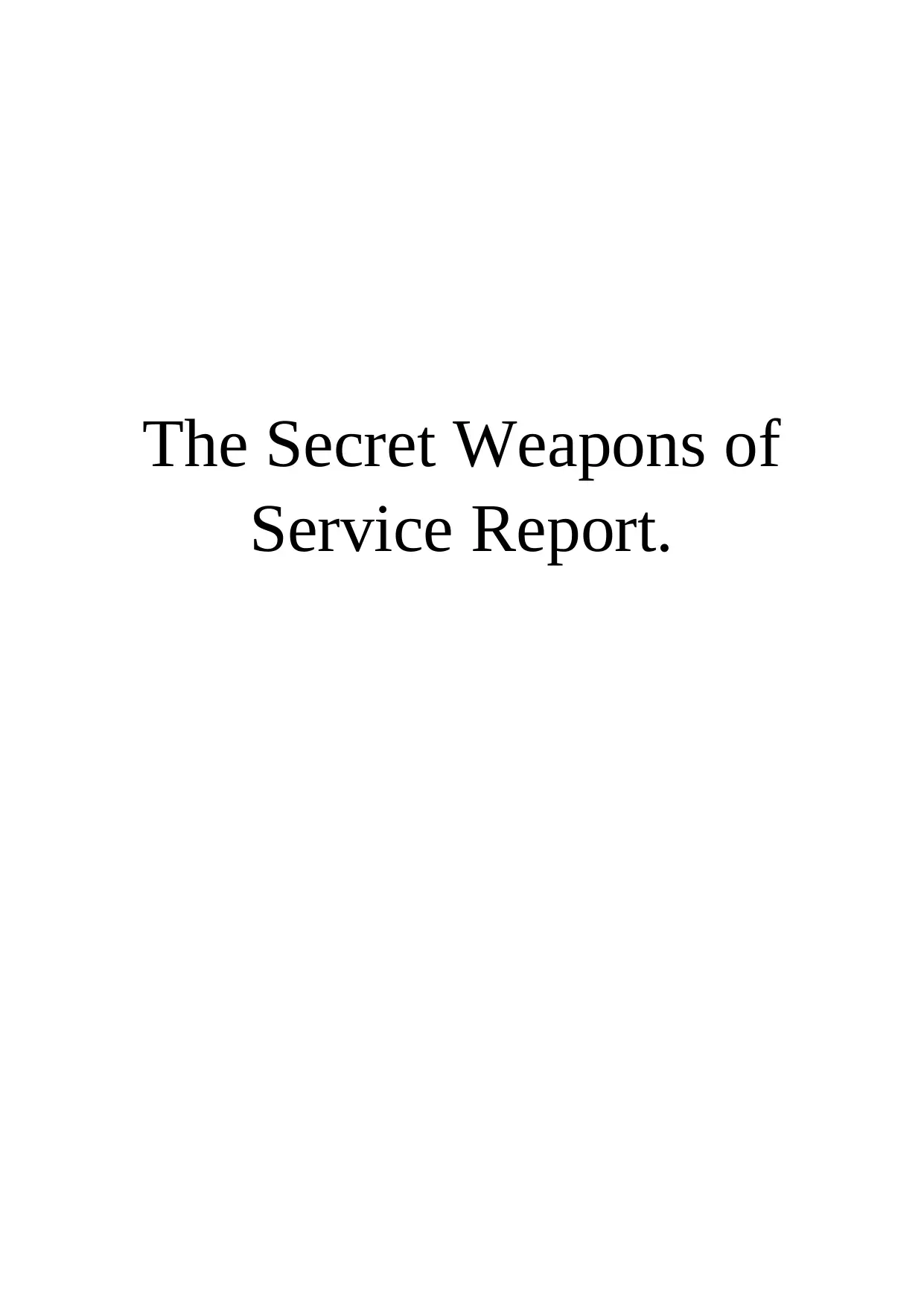
The Secret Weapons of
Service Report.
Service Report.
Paraphrase This Document
Need a fresh take? Get an instant paraphrase of this document with our AI Paraphraser
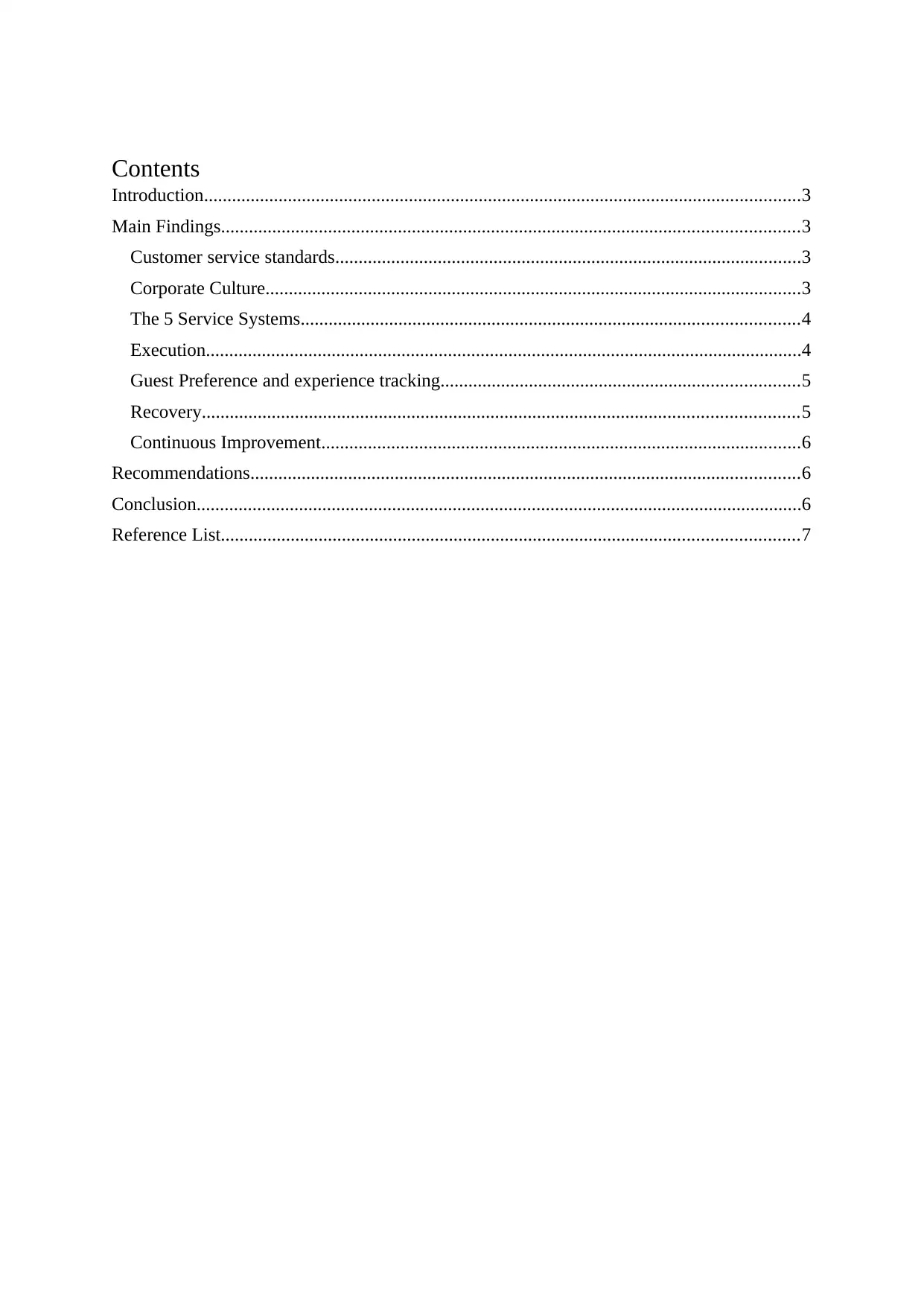
Contents
Introduction................................................................................................................................3
Main Findings............................................................................................................................3
Customer service standards....................................................................................................3
Corporate Culture...................................................................................................................3
The 5 Service Systems...........................................................................................................4
Execution................................................................................................................................4
Guest Preference and experience tracking.............................................................................5
Recovery................................................................................................................................5
Continuous Improvement.......................................................................................................6
Recommendations......................................................................................................................6
Conclusion..................................................................................................................................6
Reference List............................................................................................................................7
Introduction................................................................................................................................3
Main Findings............................................................................................................................3
Customer service standards....................................................................................................3
Corporate Culture...................................................................................................................3
The 5 Service Systems...........................................................................................................4
Execution................................................................................................................................4
Guest Preference and experience tracking.............................................................................5
Recovery................................................................................................................................5
Continuous Improvement.......................................................................................................6
Recommendations......................................................................................................................6
Conclusion..................................................................................................................................6
Reference List............................................................................................................................7
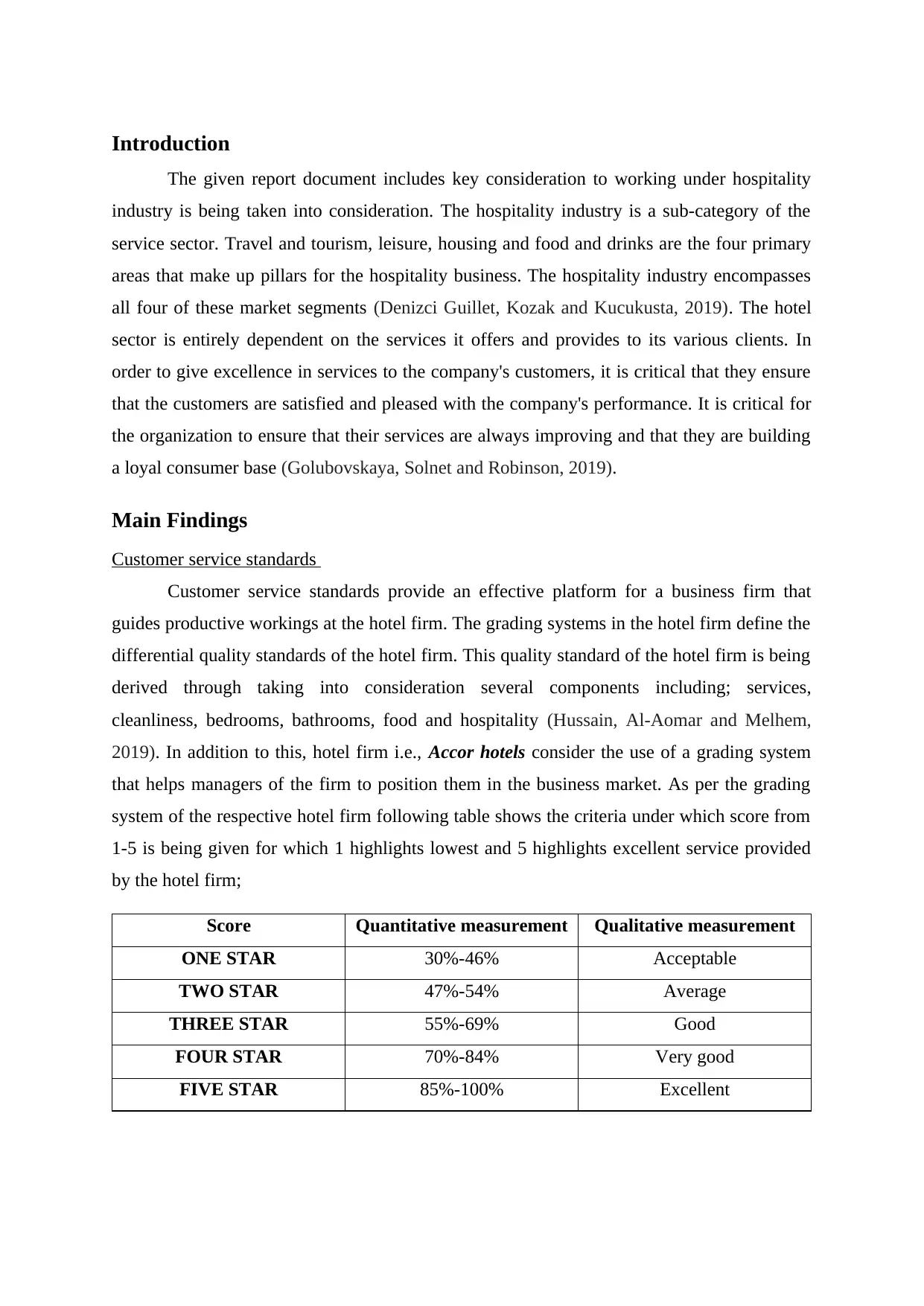
Introduction
The given report document includes key consideration to working under hospitality
industry is being taken into consideration. The hospitality industry is a sub-category of the
service sector. Travel and tourism, leisure, housing and food and drinks are the four primary
areas that make up pillars for the hospitality business. The hospitality industry encompasses
all four of these market segments (Denizci Guillet, Kozak and Kucukusta, 2019). The hotel
sector is entirely dependent on the services it offers and provides to its various clients. In
order to give excellence in services to the company's customers, it is critical that they ensure
that the customers are satisfied and pleased with the company's performance. It is critical for
the organization to ensure that their services are always improving and that they are building
a loyal consumer base (Golubovskaya, Solnet and Robinson, 2019).
Main Findings
Customer service standards
Customer service standards provide an effective platform for a business firm that
guides productive workings at the hotel firm. The grading systems in the hotel firm define the
differential quality standards of the hotel firm. This quality standard of the hotel firm is being
derived through taking into consideration several components including; services,
cleanliness, bedrooms, bathrooms, food and hospitality (Hussain, Al-Aomar and Melhem,
2019). In addition to this, hotel firm i.e., Accor hotels consider the use of a grading system
that helps managers of the firm to position them in the business market. As per the grading
system of the respective hotel firm following table shows the criteria under which score from
1-5 is being given for which 1 highlights lowest and 5 highlights excellent service provided
by the hotel firm;
Score Quantitative measurement Qualitative measurement
ONE STAR 30%-46% Acceptable
TWO STAR 47%-54% Average
THREE STAR 55%-69% Good
FOUR STAR 70%-84% Very good
FIVE STAR 85%-100% Excellent
The given report document includes key consideration to working under hospitality
industry is being taken into consideration. The hospitality industry is a sub-category of the
service sector. Travel and tourism, leisure, housing and food and drinks are the four primary
areas that make up pillars for the hospitality business. The hospitality industry encompasses
all four of these market segments (Denizci Guillet, Kozak and Kucukusta, 2019). The hotel
sector is entirely dependent on the services it offers and provides to its various clients. In
order to give excellence in services to the company's customers, it is critical that they ensure
that the customers are satisfied and pleased with the company's performance. It is critical for
the organization to ensure that their services are always improving and that they are building
a loyal consumer base (Golubovskaya, Solnet and Robinson, 2019).
Main Findings
Customer service standards
Customer service standards provide an effective platform for a business firm that
guides productive workings at the hotel firm. The grading systems in the hotel firm define the
differential quality standards of the hotel firm. This quality standard of the hotel firm is being
derived through taking into consideration several components including; services,
cleanliness, bedrooms, bathrooms, food and hospitality (Hussain, Al-Aomar and Melhem,
2019). In addition to this, hotel firm i.e., Accor hotels consider the use of a grading system
that helps managers of the firm to position them in the business market. As per the grading
system of the respective hotel firm following table shows the criteria under which score from
1-5 is being given for which 1 highlights lowest and 5 highlights excellent service provided
by the hotel firm;
Score Quantitative measurement Qualitative measurement
ONE STAR 30%-46% Acceptable
TWO STAR 47%-54% Average
THREE STAR 55%-69% Good
FOUR STAR 70%-84% Very good
FIVE STAR 85%-100% Excellent
⊘ This is a preview!⊘
Do you want full access?
Subscribe today to unlock all pages.

Trusted by 1+ million students worldwide
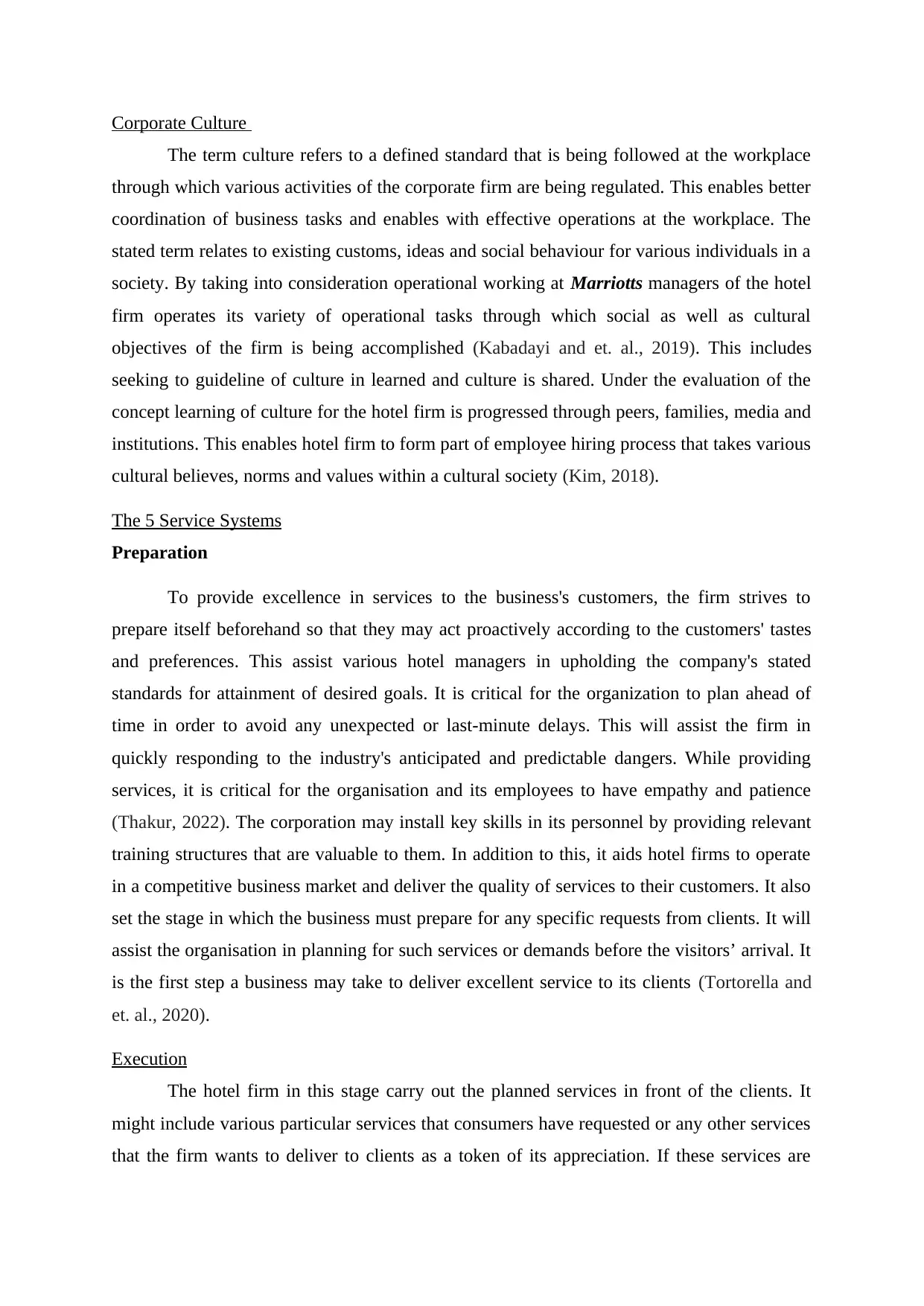
Corporate Culture
The term culture refers to a defined standard that is being followed at the workplace
through which various activities of the corporate firm are being regulated. This enables better
coordination of business tasks and enables with effective operations at the workplace. The
stated term relates to existing customs, ideas and social behaviour for various individuals in a
society. By taking into consideration operational working at Marriotts managers of the hotel
firm operates its variety of operational tasks through which social as well as cultural
objectives of the firm is being accomplished (Kabadayi and et. al., 2019). This includes
seeking to guideline of culture in learned and culture is shared. Under the evaluation of the
concept learning of culture for the hotel firm is progressed through peers, families, media and
institutions. This enables hotel firm to form part of employee hiring process that takes various
cultural believes, norms and values within a cultural society (Kim, 2018).
The 5 Service Systems
Preparation
To provide excellence in services to the business's customers, the firm strives to
prepare itself beforehand so that they may act proactively according to the customers' tastes
and preferences. This assist various hotel managers in upholding the company's stated
standards for attainment of desired goals. It is critical for the organization to plan ahead of
time in order to avoid any unexpected or last-minute delays. This will assist the firm in
quickly responding to the industry's anticipated and predictable dangers. While providing
services, it is critical for the organisation and its employees to have empathy and patience
(Thakur, 2022). The corporation may install key skills in its personnel by providing relevant
training structures that are valuable to them. In addition to this, it aids hotel firms to operate
in a competitive business market and deliver the quality of services to their customers. It also
set the stage in which the business must prepare for any specific requests from clients. It will
assist the organisation in planning for such services or demands before the visitors’ arrival. It
is the first step a business may take to deliver excellent service to its clients (Tortorella and
et. al., 2020).
Execution
The hotel firm in this stage carry out the planned services in front of the clients. It
might include various particular services that consumers have requested or any other services
that the firm wants to deliver to clients as a token of its appreciation. If these services are
The term culture refers to a defined standard that is being followed at the workplace
through which various activities of the corporate firm are being regulated. This enables better
coordination of business tasks and enables with effective operations at the workplace. The
stated term relates to existing customs, ideas and social behaviour for various individuals in a
society. By taking into consideration operational working at Marriotts managers of the hotel
firm operates its variety of operational tasks through which social as well as cultural
objectives of the firm is being accomplished (Kabadayi and et. al., 2019). This includes
seeking to guideline of culture in learned and culture is shared. Under the evaluation of the
concept learning of culture for the hotel firm is progressed through peers, families, media and
institutions. This enables hotel firm to form part of employee hiring process that takes various
cultural believes, norms and values within a cultural society (Kim, 2018).
The 5 Service Systems
Preparation
To provide excellence in services to the business's customers, the firm strives to
prepare itself beforehand so that they may act proactively according to the customers' tastes
and preferences. This assist various hotel managers in upholding the company's stated
standards for attainment of desired goals. It is critical for the organization to plan ahead of
time in order to avoid any unexpected or last-minute delays. This will assist the firm in
quickly responding to the industry's anticipated and predictable dangers. While providing
services, it is critical for the organisation and its employees to have empathy and patience
(Thakur, 2022). The corporation may install key skills in its personnel by providing relevant
training structures that are valuable to them. In addition to this, it aids hotel firms to operate
in a competitive business market and deliver the quality of services to their customers. It also
set the stage in which the business must prepare for any specific requests from clients. It will
assist the organisation in planning for such services or demands before the visitors’ arrival. It
is the first step a business may take to deliver excellent service to its clients (Tortorella and
et. al., 2020).
Execution
The hotel firm in this stage carry out the planned services in front of the clients. It
might include various particular services that consumers have requested or any other services
that the firm wants to deliver to clients as a token of its appreciation. If these services are
Paraphrase This Document
Need a fresh take? Get an instant paraphrase of this document with our AI Paraphraser
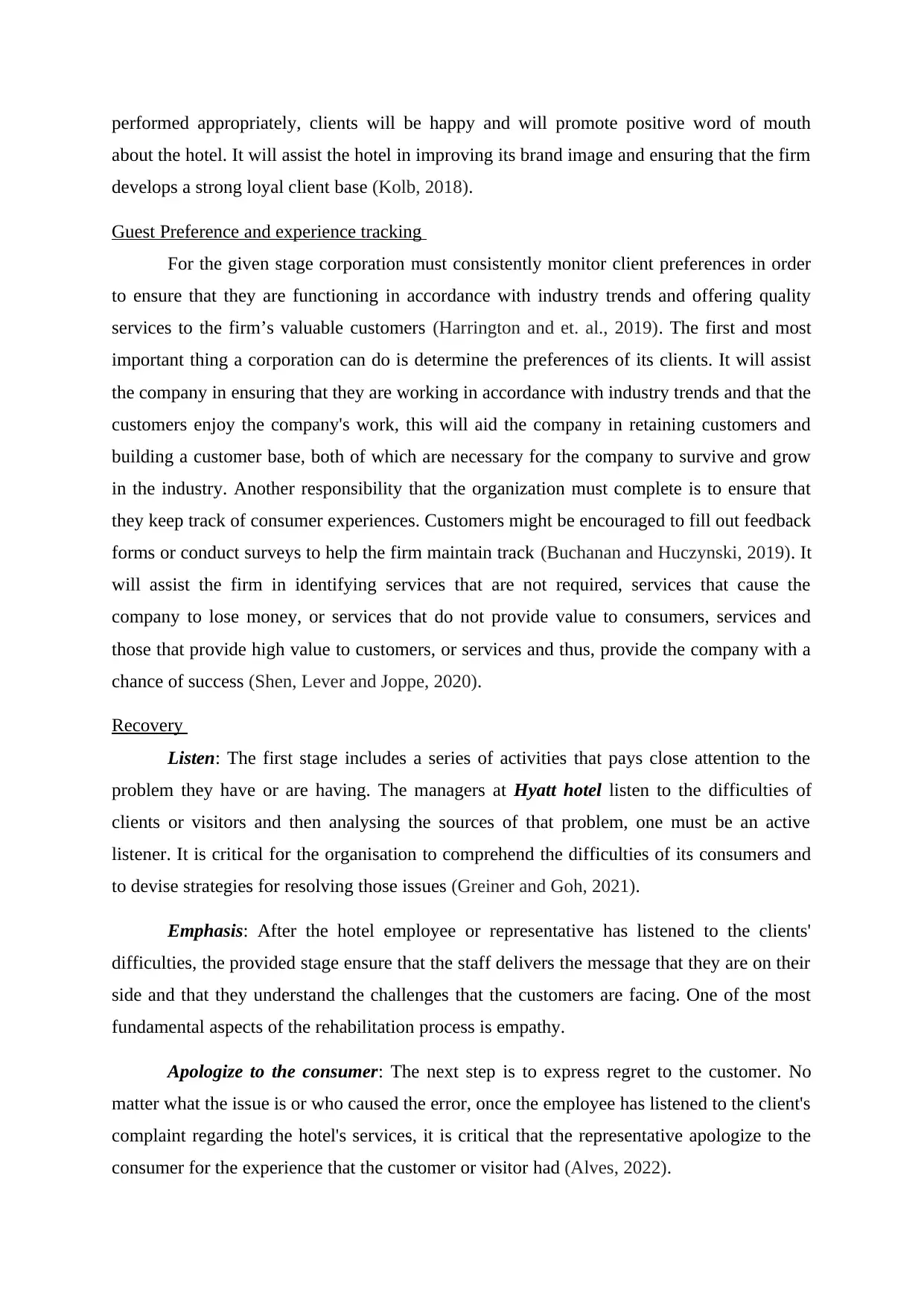
performed appropriately, clients will be happy and will promote positive word of mouth
about the hotel. It will assist the hotel in improving its brand image and ensuring that the firm
develops a strong loyal client base (Kolb, 2018).
Guest Preference and experience tracking
For the given stage corporation must consistently monitor client preferences in order
to ensure that they are functioning in accordance with industry trends and offering quality
services to the firm’s valuable customers (Harrington and et. al., 2019). The first and most
important thing a corporation can do is determine the preferences of its clients. It will assist
the company in ensuring that they are working in accordance with industry trends and that the
customers enjoy the company's work, this will aid the company in retaining customers and
building a customer base, both of which are necessary for the company to survive and grow
in the industry. Another responsibility that the organization must complete is to ensure that
they keep track of consumer experiences. Customers might be encouraged to fill out feedback
forms or conduct surveys to help the firm maintain track (Buchanan and Huczynski, 2019). It
will assist the firm in identifying services that are not required, services that cause the
company to lose money, or services that do not provide value to consumers, services and
those that provide high value to customers, or services and thus, provide the company with a
chance of success (Shen, Lever and Joppe, 2020).
Recovery
Listen: The first stage includes a series of activities that pays close attention to the
problem they have or are having. The managers at Hyatt hotel listen to the difficulties of
clients or visitors and then analysing the sources of that problem, one must be an active
listener. It is critical for the organisation to comprehend the difficulties of its consumers and
to devise strategies for resolving those issues (Greiner and Goh, 2021).
Emphasis: After the hotel employee or representative has listened to the clients'
difficulties, the provided stage ensure that the staff delivers the message that they are on their
side and that they understand the challenges that the customers are facing. One of the most
fundamental aspects of the rehabilitation process is empathy.
Apologize to the consumer: The next step is to express regret to the customer. No
matter what the issue is or who caused the error, once the employee has listened to the client's
complaint regarding the hotel's services, it is critical that the representative apologize to the
consumer for the experience that the customer or visitor had (Alves, 2022).
about the hotel. It will assist the hotel in improving its brand image and ensuring that the firm
develops a strong loyal client base (Kolb, 2018).
Guest Preference and experience tracking
For the given stage corporation must consistently monitor client preferences in order
to ensure that they are functioning in accordance with industry trends and offering quality
services to the firm’s valuable customers (Harrington and et. al., 2019). The first and most
important thing a corporation can do is determine the preferences of its clients. It will assist
the company in ensuring that they are working in accordance with industry trends and that the
customers enjoy the company's work, this will aid the company in retaining customers and
building a customer base, both of which are necessary for the company to survive and grow
in the industry. Another responsibility that the organization must complete is to ensure that
they keep track of consumer experiences. Customers might be encouraged to fill out feedback
forms or conduct surveys to help the firm maintain track (Buchanan and Huczynski, 2019). It
will assist the firm in identifying services that are not required, services that cause the
company to lose money, or services that do not provide value to consumers, services and
those that provide high value to customers, or services and thus, provide the company with a
chance of success (Shen, Lever and Joppe, 2020).
Recovery
Listen: The first stage includes a series of activities that pays close attention to the
problem they have or are having. The managers at Hyatt hotel listen to the difficulties of
clients or visitors and then analysing the sources of that problem, one must be an active
listener. It is critical for the organisation to comprehend the difficulties of its consumers and
to devise strategies for resolving those issues (Greiner and Goh, 2021).
Emphasis: After the hotel employee or representative has listened to the clients'
difficulties, the provided stage ensure that the staff delivers the message that they are on their
side and that they understand the challenges that the customers are facing. One of the most
fundamental aspects of the rehabilitation process is empathy.
Apologize to the consumer: The next step is to express regret to the customer. No
matter what the issue is or who caused the error, once the employee has listened to the client's
complaint regarding the hotel's services, it is critical that the representative apologize to the
consumer for the experience that the customer or visitor had (Alves, 2022).
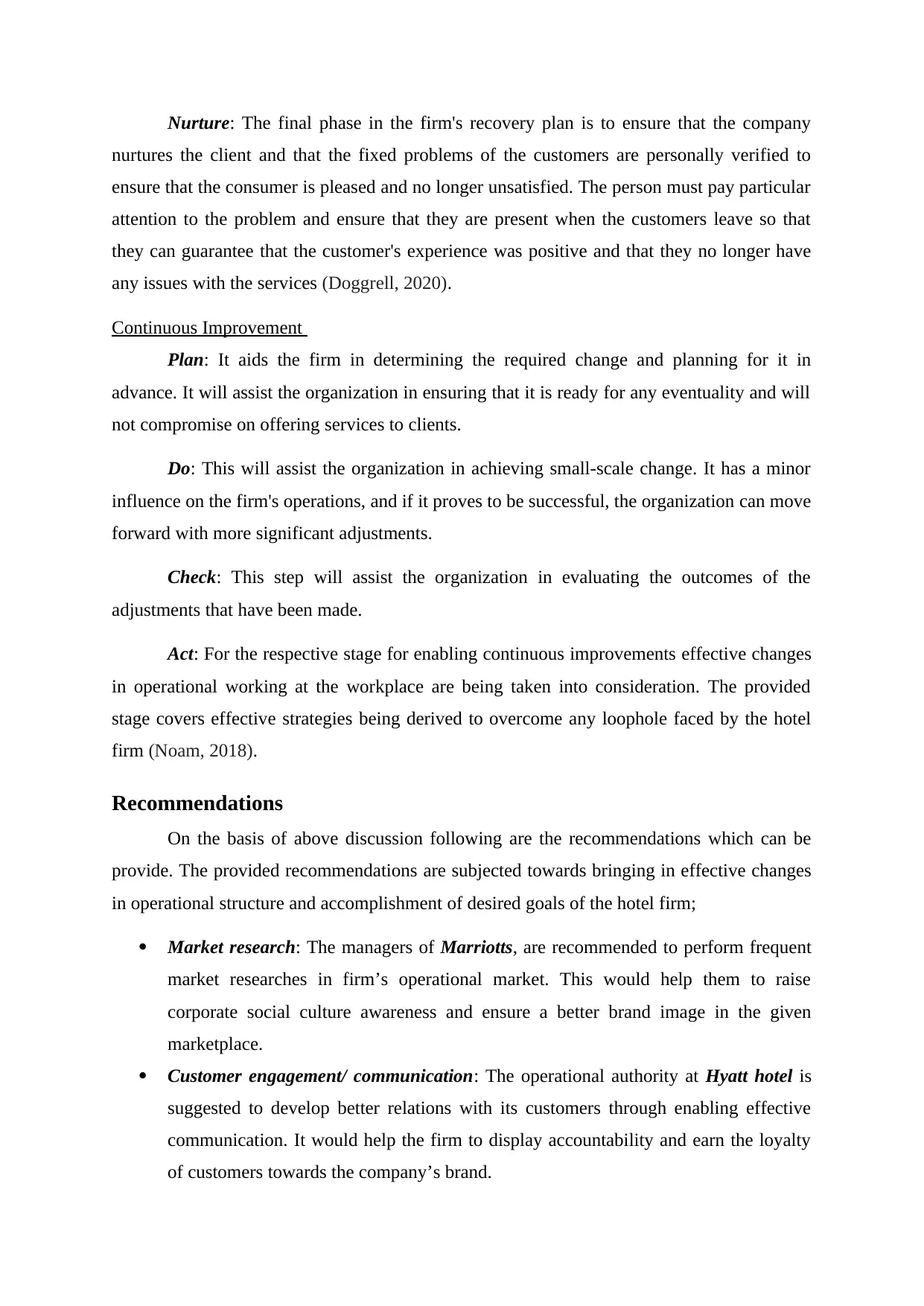
Nurture: The final phase in the firm's recovery plan is to ensure that the company
nurtures the client and that the fixed problems of the customers are personally verified to
ensure that the consumer is pleased and no longer unsatisfied. The person must pay particular
attention to the problem and ensure that they are present when the customers leave so that
they can guarantee that the customer's experience was positive and that they no longer have
any issues with the services (Doggrell, 2020).
Continuous Improvement
Plan: It aids the firm in determining the required change and planning for it in
advance. It will assist the organization in ensuring that it is ready for any eventuality and will
not compromise on offering services to clients.
Do: This will assist the organization in achieving small-scale change. It has a minor
influence on the firm's operations, and if it proves to be successful, the organization can move
forward with more significant adjustments.
Check: This step will assist the organization in evaluating the outcomes of the
adjustments that have been made.
Act: For the respective stage for enabling continuous improvements effective changes
in operational working at the workplace are being taken into consideration. The provided
stage covers effective strategies being derived to overcome any loophole faced by the hotel
firm (Noam, 2018).
Recommendations
On the basis of above discussion following are the recommendations which can be
provide. The provided recommendations are subjected towards bringing in effective changes
in operational structure and accomplishment of desired goals of the hotel firm;
Market research: The managers of Marriotts, are recommended to perform frequent
market researches in firm’s operational market. This would help them to raise
corporate social culture awareness and ensure a better brand image in the given
marketplace.
Customer engagement/ communication: The operational authority at Hyatt hotel is
suggested to develop better relations with its customers through enabling effective
communication. It would help the firm to display accountability and earn the loyalty
of customers towards the company’s brand.
nurtures the client and that the fixed problems of the customers are personally verified to
ensure that the consumer is pleased and no longer unsatisfied. The person must pay particular
attention to the problem and ensure that they are present when the customers leave so that
they can guarantee that the customer's experience was positive and that they no longer have
any issues with the services (Doggrell, 2020).
Continuous Improvement
Plan: It aids the firm in determining the required change and planning for it in
advance. It will assist the organization in ensuring that it is ready for any eventuality and will
not compromise on offering services to clients.
Do: This will assist the organization in achieving small-scale change. It has a minor
influence on the firm's operations, and if it proves to be successful, the organization can move
forward with more significant adjustments.
Check: This step will assist the organization in evaluating the outcomes of the
adjustments that have been made.
Act: For the respective stage for enabling continuous improvements effective changes
in operational working at the workplace are being taken into consideration. The provided
stage covers effective strategies being derived to overcome any loophole faced by the hotel
firm (Noam, 2018).
Recommendations
On the basis of above discussion following are the recommendations which can be
provide. The provided recommendations are subjected towards bringing in effective changes
in operational structure and accomplishment of desired goals of the hotel firm;
Market research: The managers of Marriotts, are recommended to perform frequent
market researches in firm’s operational market. This would help them to raise
corporate social culture awareness and ensure a better brand image in the given
marketplace.
Customer engagement/ communication: The operational authority at Hyatt hotel is
suggested to develop better relations with its customers through enabling effective
communication. It would help the firm to display accountability and earn the loyalty
of customers towards the company’s brand.
⊘ This is a preview!⊘
Do you want full access?
Subscribe today to unlock all pages.

Trusted by 1+ million students worldwide
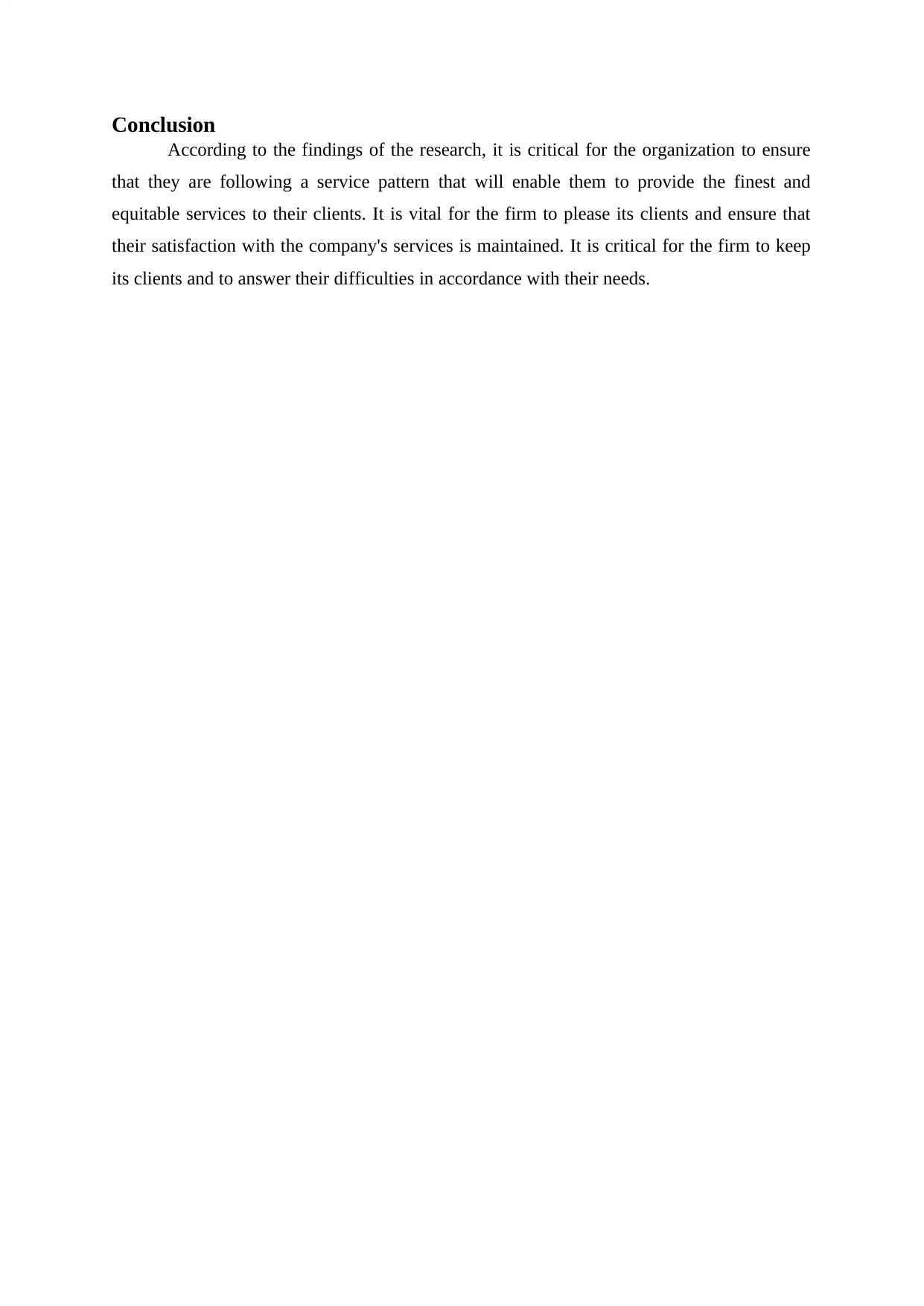
Conclusion
According to the findings of the research, it is critical for the organization to ensure
that they are following a service pattern that will enable them to provide the finest and
equitable services to their clients. It is vital for the firm to please its clients and ensure that
their satisfaction with the company's services is maintained. It is critical for the firm to keep
its clients and to answer their difficulties in accordance with their needs.
According to the findings of the research, it is critical for the organization to ensure
that they are following a service pattern that will enable them to provide the finest and
equitable services to their clients. It is vital for the firm to please its clients and ensure that
their satisfaction with the company's services is maintained. It is critical for the firm to keep
its clients and to answer their difficulties in accordance with their needs.
Paraphrase This Document
Need a fresh take? Get an instant paraphrase of this document with our AI Paraphraser
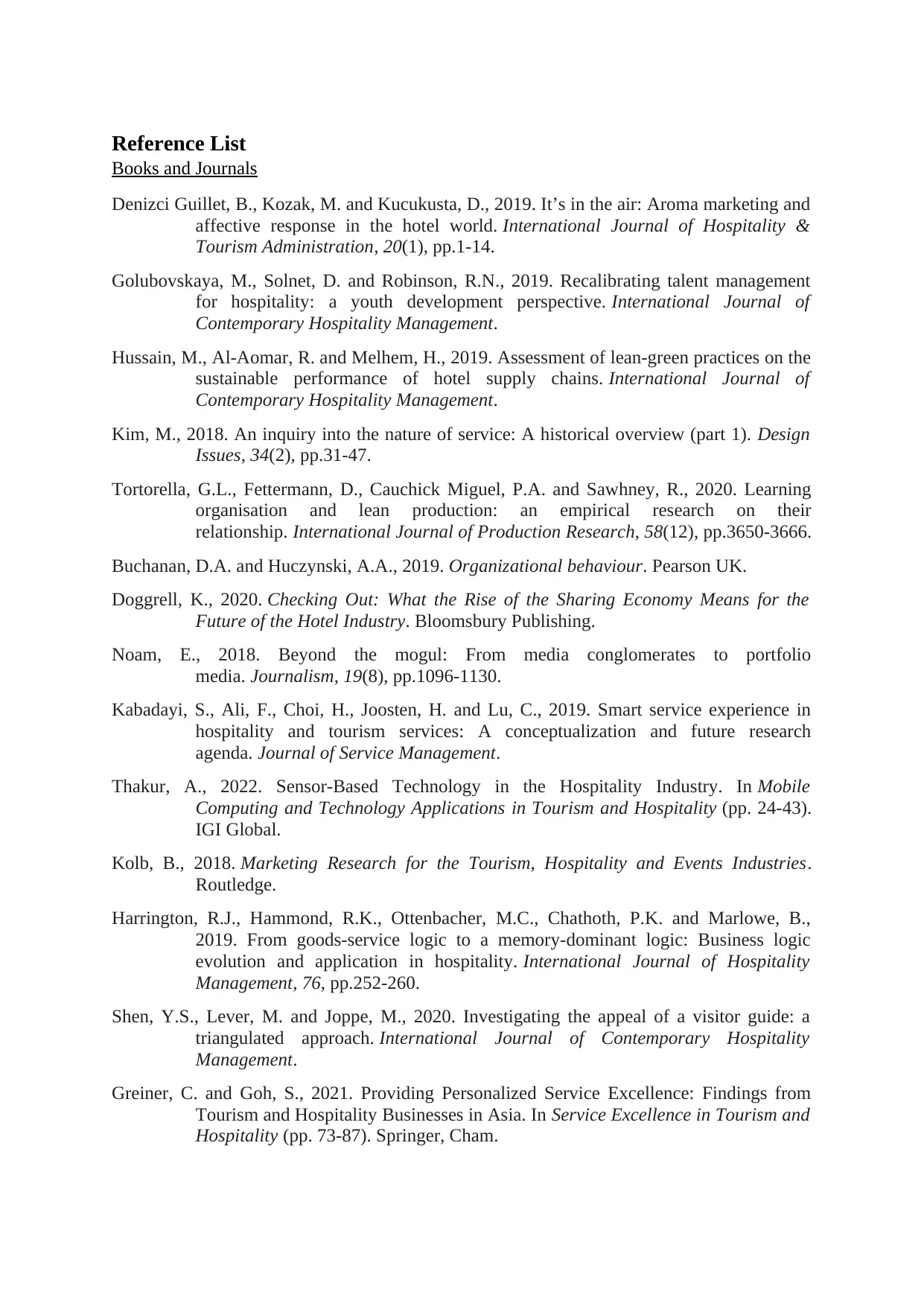
Reference List
Books and Journals
Denizci Guillet, B., Kozak, M. and Kucukusta, D., 2019. It’s in the air: Aroma marketing and
affective response in the hotel world. International Journal of Hospitality &
Tourism Administration, 20(1), pp.1-14.
Golubovskaya, M., Solnet, D. and Robinson, R.N., 2019. Recalibrating talent management
for hospitality: a youth development perspective. International Journal of
Contemporary Hospitality Management.
Hussain, M., Al-Aomar, R. and Melhem, H., 2019. Assessment of lean-green practices on the
sustainable performance of hotel supply chains. International Journal of
Contemporary Hospitality Management.
Kim, M., 2018. An inquiry into the nature of service: A historical overview (part 1). Design
Issues, 34(2), pp.31-47.
Tortorella, G.L., Fettermann, D., Cauchick Miguel, P.A. and Sawhney, R., 2020. Learning
organisation and lean production: an empirical research on their
relationship. International Journal of Production Research, 58(12), pp.3650-3666.
Buchanan, D.A. and Huczynski, A.A., 2019. Organizational behaviour. Pearson UK.
Doggrell, K., 2020. Checking Out: What the Rise of the Sharing Economy Means for the
Future of the Hotel Industry. Bloomsbury Publishing.
Noam, E., 2018. Beyond the mogul: From media conglomerates to portfolio
media. Journalism, 19(8), pp.1096-1130.
Kabadayi, S., Ali, F., Choi, H., Joosten, H. and Lu, C., 2019. Smart service experience in
hospitality and tourism services: A conceptualization and future research
agenda. Journal of Service Management.
Thakur, A., 2022. Sensor-Based Technology in the Hospitality Industry. In Mobile
Computing and Technology Applications in Tourism and Hospitality (pp. 24-43).
IGI Global.
Kolb, B., 2018. Marketing Research for the Tourism, Hospitality and Events Industries.
Routledge.
Harrington, R.J., Hammond, R.K., Ottenbacher, M.C., Chathoth, P.K. and Marlowe, B.,
2019. From goods-service logic to a memory-dominant logic: Business logic
evolution and application in hospitality. International Journal of Hospitality
Management, 76, pp.252-260.
Shen, Y.S., Lever, M. and Joppe, M., 2020. Investigating the appeal of a visitor guide: a
triangulated approach. International Journal of Contemporary Hospitality
Management.
Greiner, C. and Goh, S., 2021. Providing Personalized Service Excellence: Findings from
Tourism and Hospitality Businesses in Asia. In Service Excellence in Tourism and
Hospitality (pp. 73-87). Springer, Cham.
Books and Journals
Denizci Guillet, B., Kozak, M. and Kucukusta, D., 2019. It’s in the air: Aroma marketing and
affective response in the hotel world. International Journal of Hospitality &
Tourism Administration, 20(1), pp.1-14.
Golubovskaya, M., Solnet, D. and Robinson, R.N., 2019. Recalibrating talent management
for hospitality: a youth development perspective. International Journal of
Contemporary Hospitality Management.
Hussain, M., Al-Aomar, R. and Melhem, H., 2019. Assessment of lean-green practices on the
sustainable performance of hotel supply chains. International Journal of
Contemporary Hospitality Management.
Kim, M., 2018. An inquiry into the nature of service: A historical overview (part 1). Design
Issues, 34(2), pp.31-47.
Tortorella, G.L., Fettermann, D., Cauchick Miguel, P.A. and Sawhney, R., 2020. Learning
organisation and lean production: an empirical research on their
relationship. International Journal of Production Research, 58(12), pp.3650-3666.
Buchanan, D.A. and Huczynski, A.A., 2019. Organizational behaviour. Pearson UK.
Doggrell, K., 2020. Checking Out: What the Rise of the Sharing Economy Means for the
Future of the Hotel Industry. Bloomsbury Publishing.
Noam, E., 2018. Beyond the mogul: From media conglomerates to portfolio
media. Journalism, 19(8), pp.1096-1130.
Kabadayi, S., Ali, F., Choi, H., Joosten, H. and Lu, C., 2019. Smart service experience in
hospitality and tourism services: A conceptualization and future research
agenda. Journal of Service Management.
Thakur, A., 2022. Sensor-Based Technology in the Hospitality Industry. In Mobile
Computing and Technology Applications in Tourism and Hospitality (pp. 24-43).
IGI Global.
Kolb, B., 2018. Marketing Research for the Tourism, Hospitality and Events Industries.
Routledge.
Harrington, R.J., Hammond, R.K., Ottenbacher, M.C., Chathoth, P.K. and Marlowe, B.,
2019. From goods-service logic to a memory-dominant logic: Business logic
evolution and application in hospitality. International Journal of Hospitality
Management, 76, pp.252-260.
Shen, Y.S., Lever, M. and Joppe, M., 2020. Investigating the appeal of a visitor guide: a
triangulated approach. International Journal of Contemporary Hospitality
Management.
Greiner, C. and Goh, S., 2021. Providing Personalized Service Excellence: Findings from
Tourism and Hospitality Businesses in Asia. In Service Excellence in Tourism and
Hospitality (pp. 73-87). Springer, Cham.
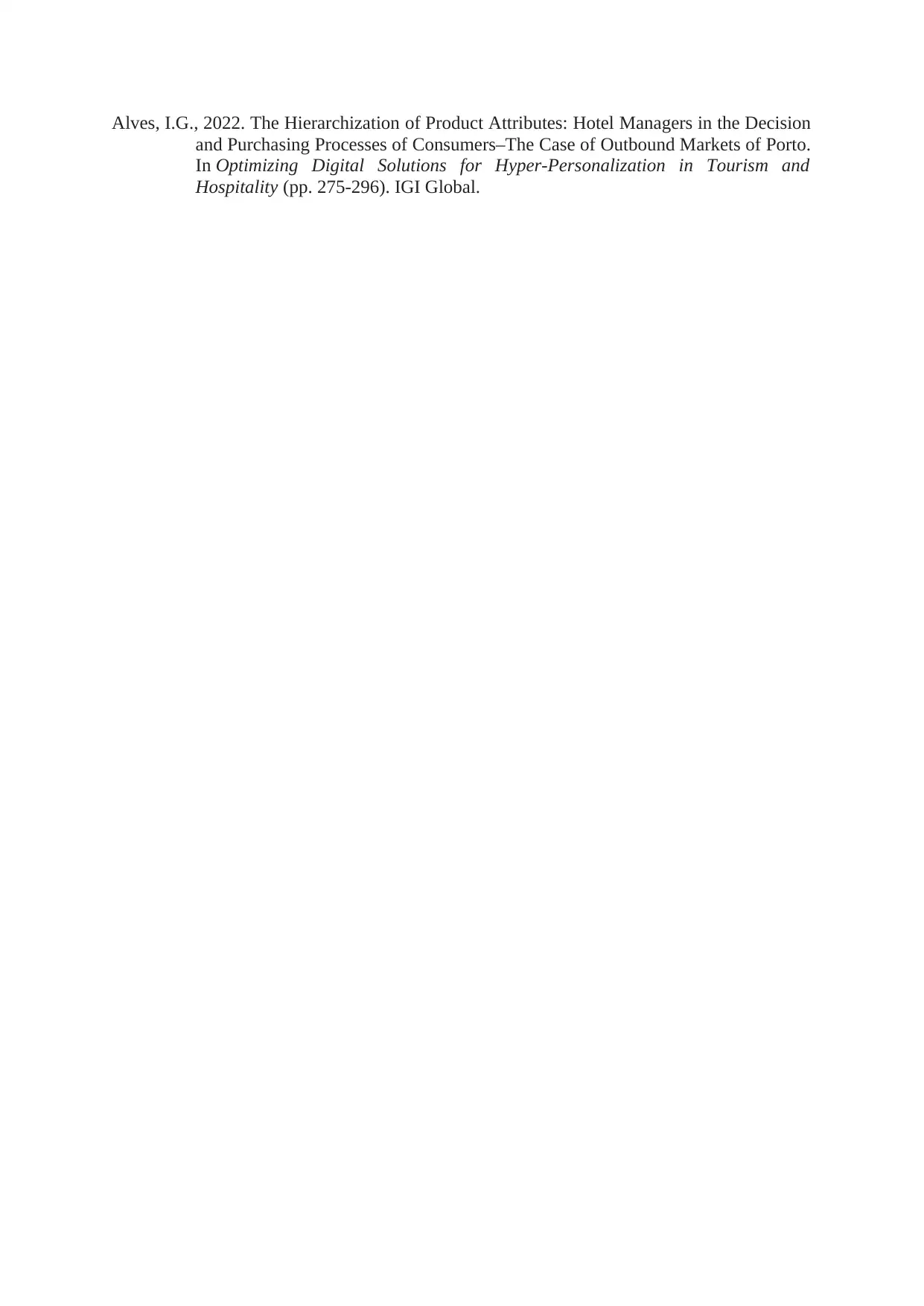
Alves, I.G., 2022. The Hierarchization of Product Attributes: Hotel Managers in the Decision
and Purchasing Processes of Consumers–The Case of Outbound Markets of Porto.
In Optimizing Digital Solutions for Hyper-Personalization in Tourism and
Hospitality (pp. 275-296). IGI Global.
and Purchasing Processes of Consumers–The Case of Outbound Markets of Porto.
In Optimizing Digital Solutions for Hyper-Personalization in Tourism and
Hospitality (pp. 275-296). IGI Global.
⊘ This is a preview!⊘
Do you want full access?
Subscribe today to unlock all pages.

Trusted by 1+ million students worldwide
1 out of 9
Related Documents
Your All-in-One AI-Powered Toolkit for Academic Success.
+13062052269
info@desklib.com
Available 24*7 on WhatsApp / Email
![[object Object]](/_next/static/media/star-bottom.7253800d.svg)
Unlock your academic potential
Copyright © 2020–2026 A2Z Services. All Rights Reserved. Developed and managed by ZUCOL.



